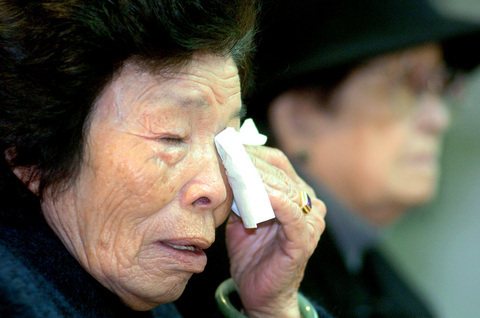Frustrated by the Japanese High Court's rejection of compensation for Taiwanese women forced to work as sex slaves for the Japanese army during World War II, activists will today launch a worldwide signature drive which they will eventually submit to the UN.
"The ruling, which is based on postwar treaties, is a slap in the face," said Cheng Chen-tao (鄭陳桃), an 83-year-old former sex slave, or "comfort woman," who filed a suit with eight other former wartime sex slaves. "I don't need any monetary compensation. I just want the world to know what the Japanese government did to comfort women, and that we deserve an official apology," she said.
Organized by the Taipei Women's Rescue Foundation, which has been supporting Taiwanese comfort women for 11 years, today's campaign includes a street march and a petition drive in front of the Tansui MRT station.

PHOTO: SEAN CHAO, TAIPEI TIMES
Activists hope to gather 1 million signatures from nations where women were forced into sex slavery by the Japanese during World War II, including Korea, the Philippines, China, Indonesia and the Netherlands. The petition, which demands that Japan take legal responsibility for the crime, will be submitted to the UN in April, the foundation said.
Foundation president Kevin Liao (廖英智) said yesterday during a press conference that activists are now considering taking the case to the International Criminal Court.
"In addition, we call on the government of Taiwan to include the enslavement of the nation's women in history textbooks, as well as establish a cenotaph at a military warehouse in Hualien, where comfort women were held and abused," Liao said.
The foundation hopes to educate the public about this tragic chapter in Taiwan's history by documenting the stories of former comfort women.
Chinese Nationalist Party (KMT) Legislator Wang Yu-ting (王昱婷) said the Japanese government should also face their history with honesty.
"What Japan did to comfort women is a violation of human rights, which has no expiration date for demanding compensation. We will keep pressuring the Japanese government until it offers a formal apology," Wang said.
In February, Japan's High Court rejected the suit brought by nine Taiwanese comfort women, saying that a 20-year period for demanding compensation had expired, and that international treaties state that reparations had to be made to states, not individuals.
It was the second legal defeat for the women, who were appealing an October 2002 ruling by the Tokyo District Court.
The women claimed that they were victims of sexual abuse by the Japanese army and that they continued to suffer discrimination after the war. Cheng said she was kidnapped on the way to school at the age of 18 and forced to work as a comfort woman.
"Relatives said that I bring shame to the family and asked me to leave after I went home. The only reason why I didn't commit suicide over the years is that I am still waiting for an apology," Cheng said while wiping away tears. According to the foundation, more than 50 suits have been filed against Japan over its wartime enslavement of women, mainly from South Korea and China.
Over the last few years, Taiwanese groups have cooperated with foreign NGOs to demand justice and repatriations from the Japanese government.
Lin said that legislators will work with the government to lobby the Japanese parliament to pass legislation that would allow the state to compensate Taiwanese comfort women.

A 72-year-old man in Kaohsiung was sentenced to 40 days in jail after he was found having sex with a 67-year-old woman under a slide in a public park on Sunday afternoon. At 3pm on Sunday, a mother surnamed Liang (梁) was with her child at a neighborhood park when they found the man, surnamed Tsai (蔡), and woman, surnamed Huang (黃), underneath the slide. Liang took her child away from the scene, took photographs of the two and called the police, who arrived and arrested the couple. During questioning, Tsai told police that he had met Huang that day and offered to

LOOKING NORTH: The base would enhance the military’s awareness of activities in the Bashi Channel, which China Coast Guard ships have been frequenting, an expert said The Philippine Navy on Thursday last week inaugurated a forward operating base in the country’s northern most province of Batanes, which at 185km from Taiwan would be strategically important in a military conflict in the Taiwan Strait. The Philippine Daily Inquirer quoted Northern Luzon Command Commander Lieutenant General Fernyl Buca as saying that the base in Mahatao would bolster the country’s northern defenses and response capabilities. The base is also a response to the “irregular presence this month of armed” of China Coast Guard vessels frequenting the Bashi Channel in the Luzon Strait just south of Taiwan, the paper reported, citing a

A total lunar eclipse, an astronomical event often referred to as a “blood moon,” would be visible to sky watchers in Taiwan starting just before midnight on Sunday night, the Taipei Astronomical Museum said. The phenomenon is also called “blood moon” due to the reddish-orange hue it takes on as the Earth passes directly between the sun and the moon, completely blocking direct sunlight from reaching the lunar surface. The only light is refracted by the Earth’s atmosphere, and its red wavelengths are bent toward the moon, illuminating it in a dramatic crimson light. Describing the event as the most important astronomical phenomenon

BETTER SERVICE QUALITY: From Nov. 10, tickets with reserved seats would only be valid for the date, train and route specified on the ticket, THSRC said Starting on Nov. 10, high-speed rail passengers with reserved seats would be required to exchange their tickets to board an earlier train. Passengers with reserved seats on a specific train are currently allowed to board earlier trains on the same day and sit in non-reserved cars, but as this is happening increasingly often, and affecting quality of travel and ticket sales, Taiwan High-Speed Rail Corp (THSRC) announced that it would be canceling the policy on Nov. 10. It is one of several new measures launched by THSRC chairman Shih Che (史哲) to improve the quality of service, it said. The company also said